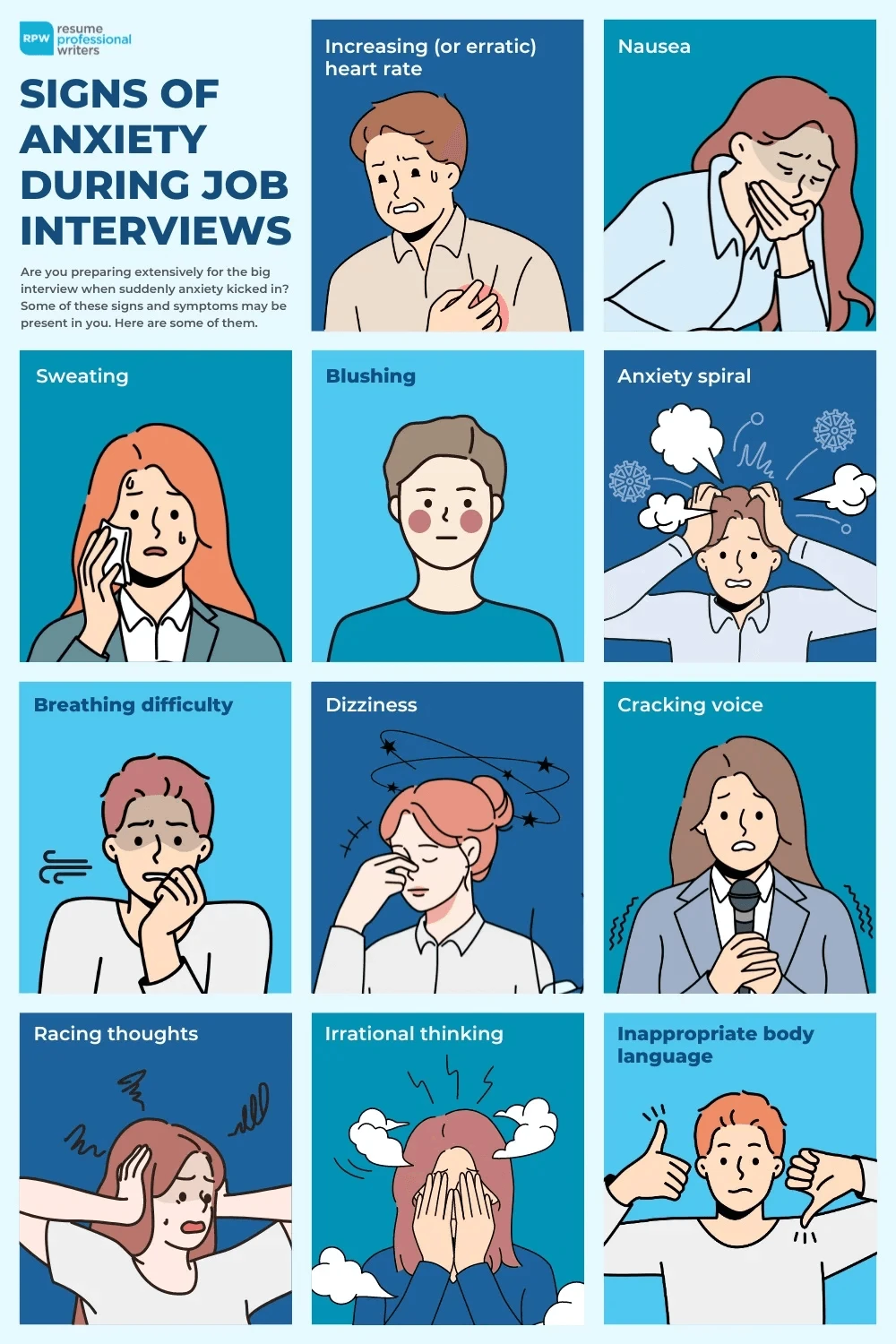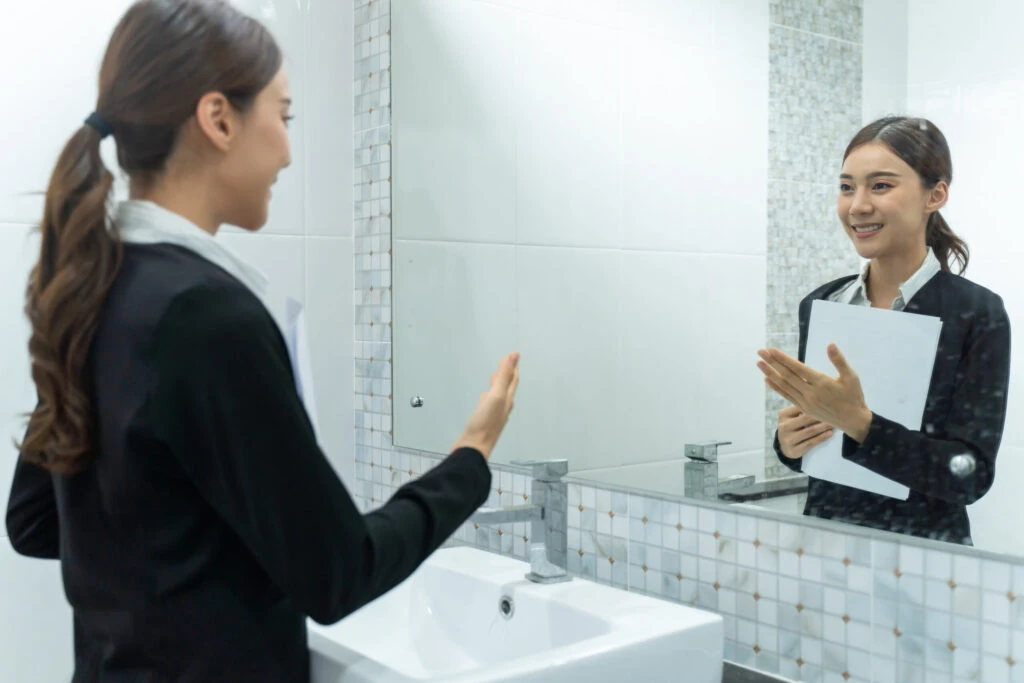Your breathing is difficult, your palms are sweating profusely, your heart is racing, your voice is trembling, and you are having negative thoughts. Do these sound familiar to you? You’re not alone! These are only a few symptoms of job interview anxiety individuals encounter before and during their job interviews.
It’s normal to experience anxiousness before a job interview. Your demeanor, appearance, words, and delivery are all about to be evaluated. If successful, you can land your dream job with a rewarding compensation and promising opportunities for growth. If not, then it’s back to square one.

What Causes Anxiety?
Writing for Business Insider, Dr. Sherry Benton stated that the human brain’s instinct to assess danger and respond to it has affected people’s behavior more in a negative way than positive.
When anxiety strikes, Dr. Benton wrote, “Our brains have a hard time distinguishing between modern distressing thoughts and actual physical threats.” Thus, a nerve-wracking interview can carry the same weight as when one’s life is in actual danger. This anxiety, she concluded, “essentially stems from the thought that someone’s quality of life hinges on their performance in an interview.”
In job searches, high risks are involved. In a job interview, the knowledge that someone else is in charge is another source of anxiety. You can’t predict their questions or their behavior. For many people, losing control can result in more tension and worry.
Sadly, your presentation on the big day can suffer due to job interview anxiety, which may manifest in significant interview slipups such as blanking out, blurting, mumbling, sweating, and twitching. If you don’t watch it, your anxious habits throughout the interview will cause the interviewer to focus on them instead and not on your accomplishments.
What is Job Interview Anxiety?
Effective communication of your qualifications for the position is the main objective of an interview. However, because they are frequently perceived as “high stakes” situations, interviews can make many people feel nervous and anxious before and during them.
Job interviews are never simple. Worse, a job interview might be much more distressing for those with anxiety issues. Some of us may be unable to attend an interview due to how crippling it can be.
Even if you know your qualifications for a position, interview nerves are relatively frequent. Nerves and stress are triggered by situations such as talking about your experiences, meeting people in positions of responsibility, and finding it challenging to market yourself.
Signs of Job Interview Anxiety: Recognizing the Stress
Are you preparing extensively for the big interview when suddenly anxiety kicked in? The signs of interview stress are briefly listed here. Keeping in mind that each person is uniquely affected by stress, the list below is by no means exclusive. Some of these signs and symptoms may be present in you. Understanding how stressful situations affect you during interviews and how to react appropriately through regular practice and planning are crucial.

Download the infographic above for future reference.
How to Overcome Job Interview Anxiety
Even experienced workers with years of interview experience can have the jitters and feel overwhelmed before, during, or after an interview. The following techniques will help you lessen your anxiety during job interviews, thereby improving your chances of getting the job.
1. Preparation is key to lowering anxiety during interviews.
An applicant who is well-prepared for an interview has the upper hand immediately. Additionally, being confident and lowering interview anxiety are two benefits of preparation.
So what is involved in preparing? First: Research. Read as much as possible about the business, come up with a list of possible interview questions, list your prior accomplishments and how they apply to the position, and practice interviewing by answering questions out loud or in a mock setting with a family or friend.
2. Try to picture yourself acing the interview.
As you enter the interview room, picture yourself extending a handshake to the interviewers and responding to their questions with assurance. After the interview, imagine being called and being given a job offer.
Close your eyes, go somewhere peaceful where you won’t be interrupted, and imagine yourself succeeding in the interview. More than merely optimistic thinking, visualizing achievement is a powerful tool. When done properly, it prompts your brain to respond in a particular manner. To perform better during tournaments, elite athletes employ this strategy.
3. Consider the interview with a new perspective.
Keep in mind that it’s not simply about being interviewed by them. Additionally, it’s a chance to decide whether they are the best company for you. Are your values reflected in the working culture? Does the entire company support diversity? Does the given wage correspond to what you think your experiences and skills are good enough to justify?

4. Put on your best outfit.
You’ll feel more assured at the interview if you dress physically and mentally healthy. Select an outfit that fits you well and is comfy in advance. Knowing the appropriate outfit to wear can ease anxiety during job interviews. Keep in mind that first impressions matter!
5. Consider the interview in its proper context and keep the overall picture in mind.
Remember that if you are not given the position, it is not the end of the world. Other chances will come up. Going full circle, when you’re prepared, you also understand the nature of job searches. This helps you frame the situation better, knowing your experience in this particular interview can prove useful to your next.
6. Arrive early for the interview.
Reduce pressures that have nothing to do with how well you performed during the interview, which include getting lost or being late. If the interview site is unfamiliar to you, research about the vicinity beforehand, considering the traffic and parking situations at that time. Try looking up the interview’s location on the map and make travel plans, estimate travel times, and decide where to park your car. Familiarize yourself with the surroundings and psychologically prepare, by coming at least 15 to 30 minutes early.
Overcoming Job Interview Anxiety: Online Mode
When your job interview will be held virtually, make sure that you have the necessary applications installed. Test your camera, microphone, and headphones to ensure your equipment is in working condition.
Also, just like in face-to-face job interview, your body language should be calm as well. Last but not least, keep in mind that there is no one-size-fits-all remedy for interview anxiety. Make use of whichever strategies or approaches suit you the most! A small bit of worry can be beneficial because it shows you are concerned about the outcome. It’s also the ideal chance for you to demonstrate to potential employers your qualifications for the position.
How to Stay Calm Throughout the Interview
Regardless of how much advanced preparation you do, it’s natural to still feel anxiety during interviews. Try these strategies if your nervousness rises during your interview with potential employers. Here are further tips to keep you calm.

1. Don’t give in to pressure.
You may now and then be subjected to a stress management interview when you are grilled. It could be tempting to fall into a cycle of unfavorable automatic thought, such as:
- They are aware that I am not up to the task.
- It was a mistake for me to apply.
- They aren’t fond of me.
- They will never hire me.
If you ever find yourself in this circumstance, be aware of the interviewer’s goals and resist the need to become irritated. Recognize that this isn’t indicative of you or your ability.
2. Ask the interviewer questions.
The opportunity to assess a potential employer comes up during interviews. It is equally important for you to decide whether you wish to work for them or not. Check to see if you can focus differently by trying to adopt this attitude. Ask inquiries that demonstrate your interest in learning whether the company will align with your professional aspirations.
3. Be patient.
You are not required to respond to questions right away. Before responding, take a moment to gather your thoughts. Take notes whenever the interviewer is speaking, if you are concerned that you won’t remember anything during the interview. By doing this, you can deflect attention from yourself and use your notes after a question has been posed. Continue taking notes and if you run out of ideas, say that you need some time to gather your thoughts.
Expert Tip:
Avoid obsessing over the interview’s outcome or what might have been done differently. Reward yourself by doing something you enjoy, such as going for a stroll in the park, cuddling up with a book, or visiting a loved one for coffee.
Professional Resume Writers’ Words of Advice
A job interview is a relatively common situation when people experience anxiety. The majority of people experience it. But you can overcome anxiety during interviews with the aid of these techniques.
As part of your preparation, a job-winning resume helps position your application atop the recruiters’ list. With the help of our expert career coaches and resume writers, you’ll be armed not only with a professionally written resume, but also practical career advice such as job interview tips. Read more career tips and elevate your chances of getting a job. Connect with us today!







